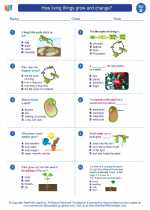Charles's Law
Charles's Law is a fundamental principle of gases that describes how the volume of a gas changes with temperature, while the pressure remains constant. It is named after the French scientist Jacques Charles, who first formulated the law in the 18th century.
Statement of Charles's Law:
Charles's Law states that the volume of a given mass of gas is directly proportional to its absolute temperature, provided that the pressure remains constant. In simpler terms, as the temperature of a gas increases, its volume also increases, and as the temperature decreases, its volume decreases.
Mathematical Representation:
The relationship between the volume and temperature of a gas at constant pressure can be expressed by the equation:
V1/T1 = V2/T2
Where: V1 = initial volume of the gas T1 = initial temperature of the gas (in Kelvin) V2 = final volume of the gas T2 = final temperature of the gas (in Kelvin)
Study Guide for Charles's Law:
- Understand the Relationship: Charles's Law describes the direct relationship between the volume and temperature of a gas at constant pressure. As the temperature increases, the volume of the gas expands, and vice versa.
- Temperature in Kelvin: Remember that temperature must be expressed in Kelvin when using Charles's Law. To convert temperature from Celsius to Kelvin, simply add 273.15 to the Celsius temperature.
- Use the Proportional Relationship: When solving problems using Charles's Law, recognize that the volume and temperature are directly proportional. This means that if one quantity doubles, the other also doubles, and if one quantity halves, the other also halves.
- Apply the Equation: Use the equation V1/T1 = V2/T2 to solve problems related to changes in the volume and temperature of a gas at constant pressure.
- Real-life Applications: Discuss real-life examples of Charles's Law, such as the behavior of balloons when exposed to different temperatures or the functioning of a hot air balloon.
Understanding Charles's Law is essential for comprehending the behavior of gases and is a foundational concept in the study of thermodynamics and gas laws.
.◂Science Worksheets and Study Guides Second Grade. How living things grow and change?

 Activity Lesson
Activity Lesson
 Worksheet/Answer key
Worksheet/Answer key
 Worksheet/Answer key
Worksheet/Answer key
 Worksheet/Answer key
Worksheet/Answer key
 Worksheet/Answer key
Worksheet/Answer key
 Vocabulary/Answer key
Vocabulary/Answer key
